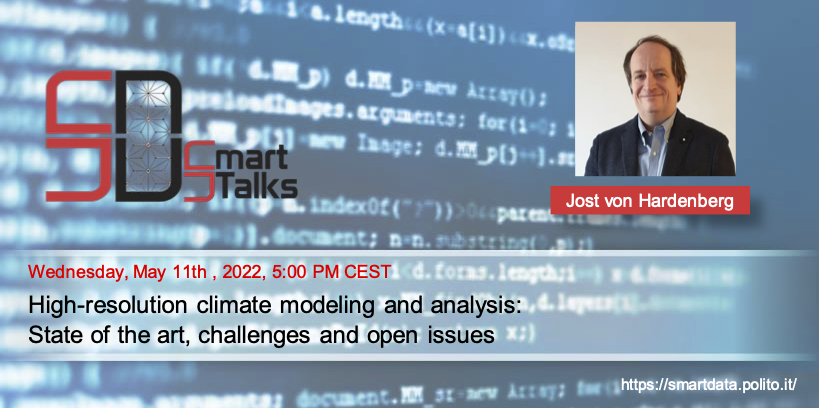
Presenter: Jost von Hardenberg
Wednesday, May 11th, 2022 17:00
Location: SmartData@Covivio
Numerical global climate modelling with Earth-system models is currently one of the main tools available for studying processes and feedbacks at work in the climate system, attribution of climate change, projection of future climate change scenarios and the development and planning of mitigation and adaptation measures.
These models have seen in the past decades an extraordinary evolution in terms of the number of components of the climate system represented and of numerical resolution. In addition to a growing need for HPC resources, this progress has been accompanied by a constant growth of the data produced, posing significant challenges in data analysis, distribution, discovery and storage and requiring the development of common community data standards.
Despite this progress, there is still a significant gap in scales between the data provided by state-of-the-art Earth System models, which have been mainly developed for the purpose of scientific enquiry, and the scales needed for many applications for climate impact studies at the local scale, leading to the development of different dynamical and statistical downscaling approaches. In parallel, climate impact studies require a quantification of uncertainty produced at all steps in such a modelling chain, requiring large ensembles of model simulations.
A novel and promising approach to overcome some of these limitations, making use of recent advancements in HPC capability, is the development of a next generation of Km-scale models, which is under way in these years, but which will bring with it novel challenges in the access and the analysis of the resulting data.
In this talk I will give a brief overview of these topics which all lie at the frontier between Physical sciences, climatology, data analytics and HPC numerics, together with some examples from my experience and a short discussion of which are, in my opinion, the main current challenges.
Biography: Jost von Hardenberg is a full professor at Politecnico di Torino, in the Department of Environment, Land and Infrastructure Engineering. His research focuses on modelling climate and the fundamental processes which regulate the earth system, particularly climate dynamics, the hydrological cycle, geophysical flows, biosphere-climate interactions, climate extremes, stochastic precipitation downscaling methods and climate impacts. Current work includes the development of the EC-Earth global climate model and of the PlaSim Earth-System Model of Intermediate Complexity and numerical simulations, analyzing climate sensitivity, tipping points, atmosphere-sea-ice-ocean feedbacks and climate impacts. Other research interests include soil-vegetation-atmosphere interactions and convective flows, also using high-resolution parallel numerical codes. Ampleexperience in the use of HPC machines, in the development of MPI parallel fluid-dynamics codes, in the management and analysis of large numerical climate datasets.
